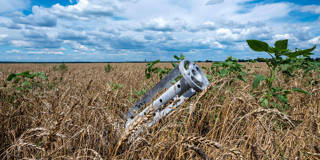Contrary to the Kremlin’s claims, the West is not to blame for current food shortages in the developing world. But it does have a responsibility to help address them, rather than leaving these countries to fend for themselves, as it largely did during the COVID-19 pandemic.
MADRID – Actions speak louder than words. That adage explains why Russian President Vladimir Putin’s depiction of his brutal and senseless war in Ukraine as a noble fight against Western imperialism comes across as farcical. It should also inform Western leaders’ response to the crises that war has fueled – including the food crisis that looms over vulnerable populations in Africa.
While climate change and the pandemic were undermining food security well before Russia’s invasion of Ukraine, the situation is even more dire now, particularly in low-income African countries that depend on food imports from Russia and Ukraine. Globally, a staggering 345 million people face acute food insecurity, with hundreds of millions more going to bed hungry every night. As United Nations Secretary-General António Guterres warned last month, there is a real risk of multiple famines this year.
Lack of access to food exported from Russia and Ukraine is only part of the problem. Fertilizer is vital to grow staple foods such as wheat, maize, and rice. And both Russia and Ukraine are major producers of fertilizers and suppliers of the raw materials used to make them. Russia’s war, together with its squeeze on natural gas (a key fertilizer input), has thus contributed to severe shortages.

MADRID – Actions speak louder than words. That adage explains why Russian President Vladimir Putin’s depiction of his brutal and senseless war in Ukraine as a noble fight against Western imperialism comes across as farcical. It should also inform Western leaders’ response to the crises that war has fueled – including the food crisis that looms over vulnerable populations in Africa.
While climate change and the pandemic were undermining food security well before Russia’s invasion of Ukraine, the situation is even more dire now, particularly in low-income African countries that depend on food imports from Russia and Ukraine. Globally, a staggering 345 million people face acute food insecurity, with hundreds of millions more going to bed hungry every night. As United Nations Secretary-General António Guterres warned last month, there is a real risk of multiple famines this year.
Lack of access to food exported from Russia and Ukraine is only part of the problem. Fertilizer is vital to grow staple foods such as wheat, maize, and rice. And both Russia and Ukraine are major producers of fertilizers and suppliers of the raw materials used to make them. Russia’s war, together with its squeeze on natural gas (a key fertilizer input), has thus contributed to severe shortages.